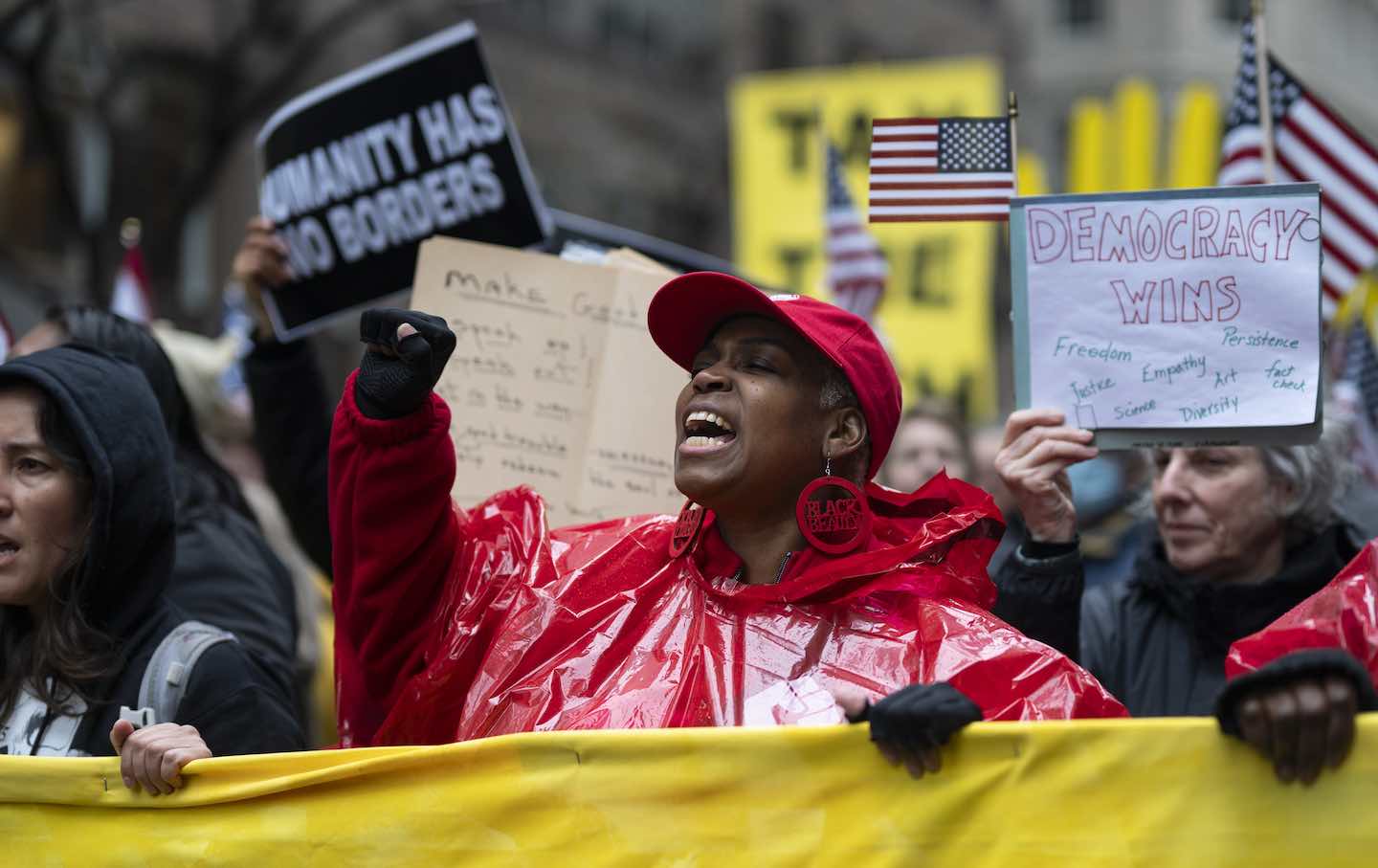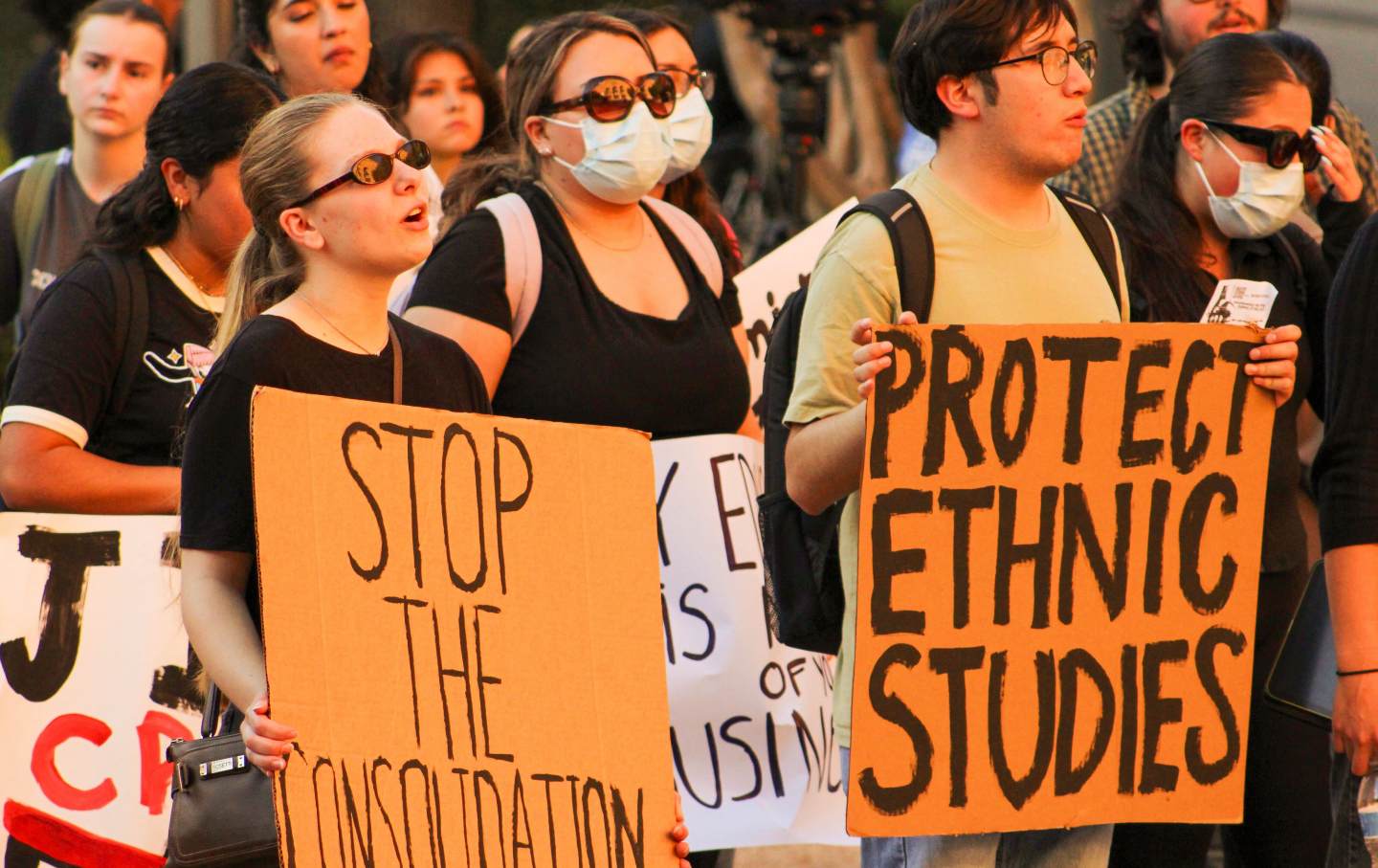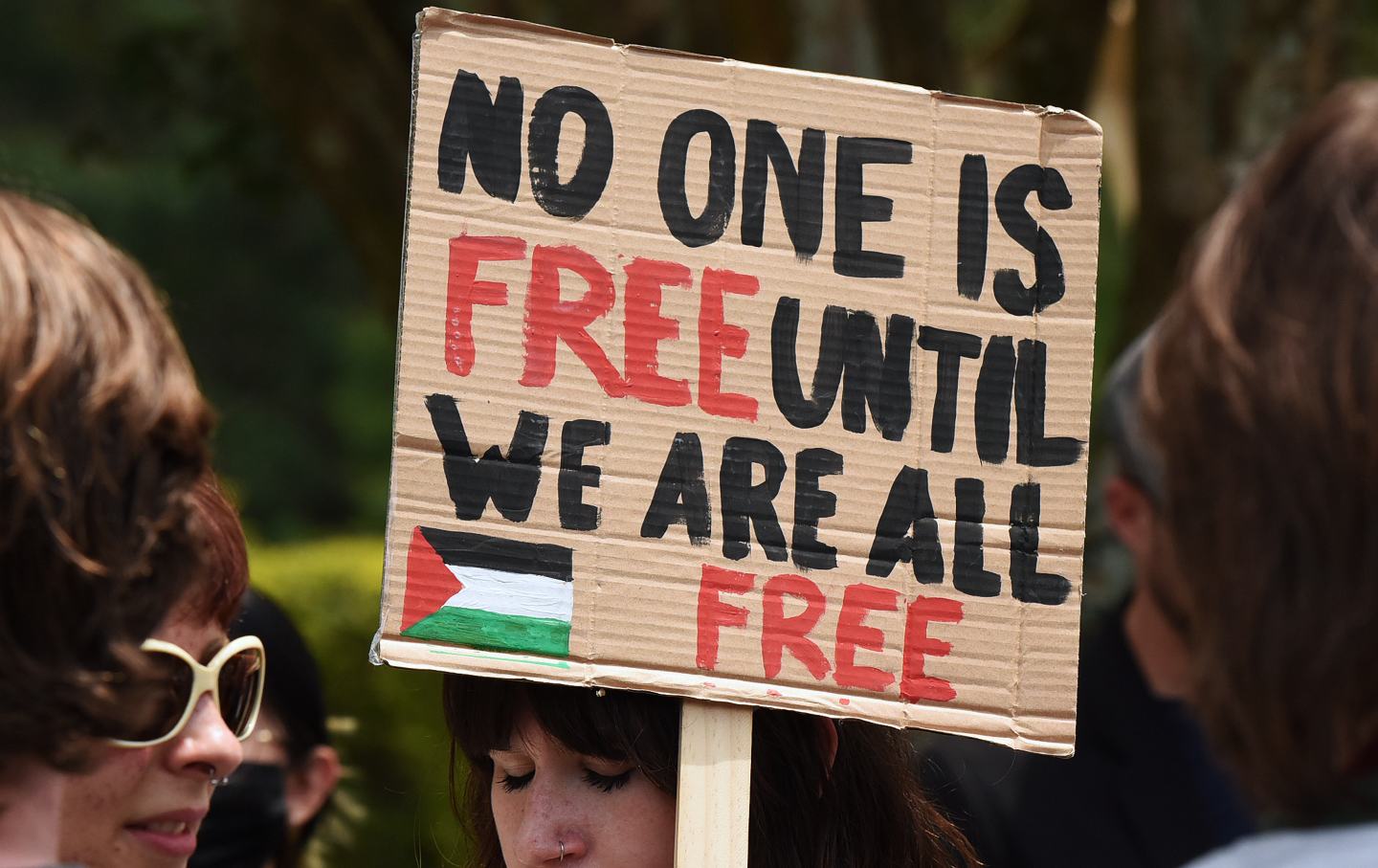We Can Defeat Trump’s Lawlessness. We’ve Done It Before.
Donald Trump’s intimidation tactics are not new. At the height of the civil rights movement, segregationists harassed our civil rights lawyers.

People take part in a massive anti-Trump “Hands Off” protest and march in New York City, New York, April 5, 2025.
(Mostafa Bassim / Anadolu via Getty Images)In our collective imagination, there’s a common nightmare about how democracies fall. Tanks rolling in. War breaking out. Blood spilled.
But history tells a different story—less dramatic, but no less devastating. Most democracies don’t die by gunfire. They die gradually. Quietly. Passively. A right revoked. A freedom restricted. A norm shattered. A collective silence. Before long, you look around and realize that the scaffolding of democracy has been dismantled in plain sight.
It’s why the rule of law must be protected at all costs. Encroachments on it are not mere policy disputes. They are the canaries in the coal mine. And today, those canaries are gasping for air.
Since returning to the White House less than three months ago, Donald Trump has trampled constitutional norms, civil rights, and the rule of law. He’s ordered the arrest of peaceful protesters, gutted LGBTQ+ protections, undermined voting rights, deported lawful residents, fomented the unbridled hate that fuels antisemitism, and resurrected a level of anti-Black racism not seen in the modern era. The proverbial tanks are here—but instead of carrying rifles and soldiers, they’re armed with executive orders, presidential fiats, and white nationalist codespeak.
One of the most alarming instances of Trump’s disregard for the rule of law came last month in a series of executive actions naming and punishing various law firms and attorneys that have represented clients whom the president perceives to be political enemies. On March 6, Trump targeted Perkins Coie for representing his political rivals during the 2016 election and allegedly unlawful diversity, equity, and inclusion practices. On March 25, he targeted Jenner & Block for its past employment of a prosecutor who was involved in special counsel Robert Mueller’s investigation into Trump for election interference. Two days later, on March 27, he targeted Wilmer Cutler Pickering Hale and Dorr for its past employment of Mueller himself. And on March 23, Trump issued a broader memorandum directing the Justice Department—in theory an impartial arbiter of the law, but under this administration a tool for implementing the president’s vendettas —to seek sanctions against attorneys or firms that challenge him in court with purported “frivolous” claims despite his steady record of court losses.
These are not policy disagreements or differences of opinion; they are direct assaults on the independence of the legal profession. And, to paraphrase US District Judge Beryl Howell in describing the executive order punishing Perkins Coie, the scope and scale of the attacks on the legal profession should send chills down every American’s spine.
At the Legal Defense Fund, we know this tactic better than any other legal organization in the country, sadly—we’ve lived it before. At the height of the civil rights movement, segregationists across the South weaponized state power to harass and intimidate our civil rights lawyers in an effort to prevent us from engaging in advocacy. Alabama demanded that the NAACP, of which we were a part until 1957, disclose its membership lists. Texas falsely accused and sued the NAACP and LDF over a “medley of charges,” including allegedly generating profit while claiming nonprofit status. Georgia tax authorities jailed the NAACP’s Atlanta chapter president. And Arkansas dissolved the state NAACP by executive order.
Then, as now, the goal was simple: Destroy the lawyers and you weaken the prospect of opposition. Thankfully, that is not how the story ended then, and it is not how it is destined to end now. We, the American people, have the wherewithal to chart a different course.
The president’s actions aren’t just authoritarian; they’re also deeply un-American. They threaten the constitutional principle that every individual and institution deserves legal representation, and that lawyers must be free to do their jobs without fear of reprisal. That principle is foundational—not just to our profession, but to American democracy.
That’s why LDF filed an amicus brief last week in Perkins Coie LLP v. U.S. Department of Justice, as well as on behalf of law firms Wilmer Hale and Jenner & Block, urging the court to reject this blatant abuse of executive power. If lawyers are forced to choose their clients based on fear of retaliation, the rule of law and the constitutional order it undergirds will crumble. And without an independent bar and judiciary, there will be no check on Trump’s lawlessness.
Indeed, we are seeing only the beginning of Trump’s radical agenda, including these intimidation tactics and the normalization of ideas once considered unthinkable. In recent weeks, after sending hundreds of migrants the administration has deemed violent gang members to El Salvador’s Terrorism Confinement Center, without providing evidence of such membership (beyond wrongly identified tattoos), President Trump casually and repeatedly floated the idea of exiling American inmates to the notorious maximum security prison. This notion—what would be a massive violation of the civil and human rights and civil liberties of American citizens—is among the most atrocious threats Trump has issued. He won’t stop there.
So where do we go from here?
Defend. Disrupt. Dream. That is LDF’s prescription.
We must defend the rule of law. Defending against autocracy—whether foreign or domestic—is central to the history of this country. Defense is itself both a demonstration of strength and norms and a testament to the enduring power of the rule of law and fairness, even under relentless attacks.
Second, we must disrupt the machinery of authoritarianism. That means challenging illegal executive actions, using every procedural, technical, and structural lever within the bounds of the law. It’s why LDF is standing with and supporting law firms who are challenging Trump’s executive orders and why we are challenging this administration’s overreach in other cases. This is not a moment for moderation.
Popular
“swipe left below to view more authors”Swipe →And finally, we must dream. To dream in this moment is itself an act of resistance. Our ancestors dreamed of freedom even though their hands were shackled; they conceived of justice while enduring systemic cruelty; they believed in a multiracial democracy even though it defied the only reality they had ever known. Their dreams changed this country. Ours must too.
This is not a battle for lawyers alone. It is a fight that demands the full attention and participation of every American—liberal and conservative, skeptic and idealogue. If democracy is to endure, it will do so only if we all rise to meet this moment with unwavering fidelity to the law and undying conviction to deliver justice.
Support independent journalism that does not fall in line
Even before February 28, the reasons for Donald Trump’s imploding approval rating were abundantly clear: untrammeled corruption and personal enrichment to the tune of billions of dollars during an affordability crisis, a foreign policy guided only by his own derelict sense of morality, and the deployment of a murderous campaign of occupation, detention, and deportation on American streets.
Now an undeclared, unauthorized, unpopular, and unconstitutional war of aggression against Iran has spread like wildfire through the region and into Europe. A new “forever war”—with an ever-increasing likelihood of American troops on the ground—may very well be upon us.
As we’ve seen over and over, this administration uses lies, misdirection, and attempts to flood the zone to justify its abuses of power at home and abroad. Just as Trump, Marco Rubio, and Pete Hegseth offer erratic and contradictory rationales for the attacks on Iran, the administration is also spreading the lie that the upcoming midterm elections are under threat from noncitizens on voter rolls. When these lies go unchecked, they become the basis for further authoritarian encroachment and war.
In these dark times, independent journalism is uniquely able to uncover the falsehoods that threaten our republic—and civilians around the world—and shine a bright light on the truth.
The Nation’s experienced team of writers, editors, and fact-checkers understands the scale of what we’re up against and the urgency with which we have to act. That’s why we’re publishing critical reporting and analysis of the war on Iran, ICE violence at home, new forms of voter suppression emerging in the courts, and much more.
But this journalism is possible only with your support.
This March, The Nation needs to raise $50,000 to ensure that we have the resources for reporting and analysis that sets the record straight and empowers people of conscience to organize. Will you donate today?
More from The Nation

The Real Reason Americans Love Guns The Real Reason Americans Love Guns
With a weak social safety net, a gun offers a false sense of personal power and security.

The Endless Hypocrisy of Bari Weiss The Endless Hypocrisy of Bari Weiss
She claims to be a free speech champion. But as her actions at CBS News keep showing, she seems to think free speech should run only in a rightward direction.

What Will Be Left After the University of Texas Destroys Itself? What Will Be Left After the University of Texas Destroys Itself?
UT-Austin has collapsed its race, ethnic, and gender studies into a single program while a new policy asks faculty to avoid “controversial” topics. But the attacks won’t end there...

The Corporate Media Is Head Over Heels for the Iran War The Corporate Media Is Head Over Heels for the Iran War
Donald Trump’s attack may be surreal, unjustified, and illegal. But that’s not stopping the press from turning the propaganda dial way up.

The Disturbing History of ICE’s “Death Cards” The Disturbing History of ICE’s “Death Cards”
The Vietnam-era practice is yet another example of ICE agents thrilling to the brutality they have been encouraged to cultivate.

The American Universities Programming Israel’s Killer Drones The American Universities Programming Israel’s Killer Drones
Industry partnerships in higher education are pushing STEM graduates into the business of weapons manufacturing and genocide profiteering.


